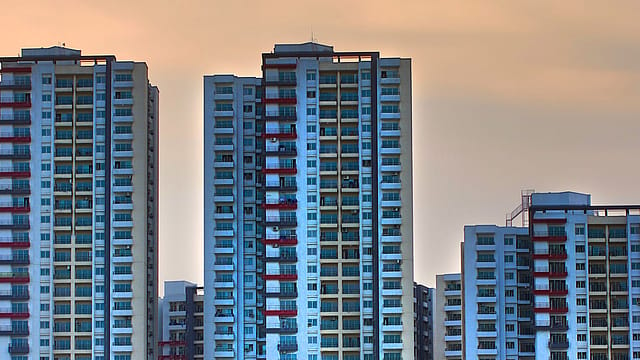Realty stocks cheer RBI impetus to credit flow, demand
ADVERTISEMENT

Real estate companies on Wednesday welcomed the Reserve Bank of India’s decisions to improve credit flow to the realty sector and boost demand. Cheering the developments, shares of DLF, Sobha, Oberoi Realty, Godrej Properties, and Brigade Enterprises rose up to 3%. In comparision, the BSE realty index rose 2%, while the 30-share benchmark Sensex gained 220 points to 55,324 levels.
In a major boost to the realty sector, the RBI on Wednesday announced policy measures to increase limits on the amount of individual housing loans offered by cooperative banks. “Taking into account the increase in housing prices since the limits were last revised and considering the customer needs, it has been decided to increase the existing limits on individual housing loans by cooperative banks,” says RBI in its monetary policy statement on Wednesday.
Accordingly, the limits for tier I and tier II urban co-operative banks (UCBs) have been revised from ₹30 lakh and ₹70 lakh to ₹60 lakh and ₹140 lakh, respectively. In case of rural cooperative banks (RCBs), the limits have been increased from ₹20 lakh to ₹50 lakh for RCBs with assessed net worth less than ₹100 crore; and from ₹30 lakh to ₹75 lakh for other RCBs.
Adding to it, the apex bank permitted rural co-operative banks (RCBs) to lend to commercial real estate, while it also allowed UCBs to offer door-step banking to their customers on par with scheduled commercial banks. “Considering the growing need for affordable housing and to realise their potential in providing credit facilities to the housing sector, it has been decided to allow StCBs and DCCBs to extend finance to Commercial Real Estate – Residential Housing (CRE-RH) within the existing aggregate housing finance limit of 5% of their total assets. A detailed circular will be issued separately,” the release noted.
Meanwhile, the central bank increased the policy repo rate (or repo rate) by 50 basis points (bps) in line with market expectations. This is the second hike in the last two months after the RBI raises repo rate by 40 bps in an off-cycle policy announcement in May to ease inflationary pressure on the economy.
After the current hike, the repo rate increased by 0.9%, which is likely to push home loans and auto loans higher. Anil Rego, founder and fund manager, Right Horizons PMS, says that the floating-rate loans will get costlier while all new loans are likely to be priced higher. The equated monthly instalment (EMI) of floating rate changes with changes in the market interest rates.
“The increase in repo rate will affect all the retail floating rate loans such as home loans, car loans, gold loans or personal loans,” he says.
For instance, if you have a home loan with ₹30 lakh outstanding with a balance tenure of 20 years at 7% per annum interest, your EMI will go up by ₹1,648 from ₹23,259 to ₹24,907. For each lakh rupees of loan, you may have to dole out ₹55 extra for EMI.
Similarly for an auto loan of ₹8 lakh for a tenure of 7 years if the interest rate rises from 10% to 10.9% the corresponding increase in EMI will be ₹375 from ₹13,281 to ₹13,656.
Personal loan of ₹5 lakh with a tenure of 5 years, if the interest rate rises from 14% to 14.9% your EMI will increase by ₹235 from ₹11,634 to ₹11,869. The existing loans which are at fixed interest rate do not have any impact with the repo rate hike.